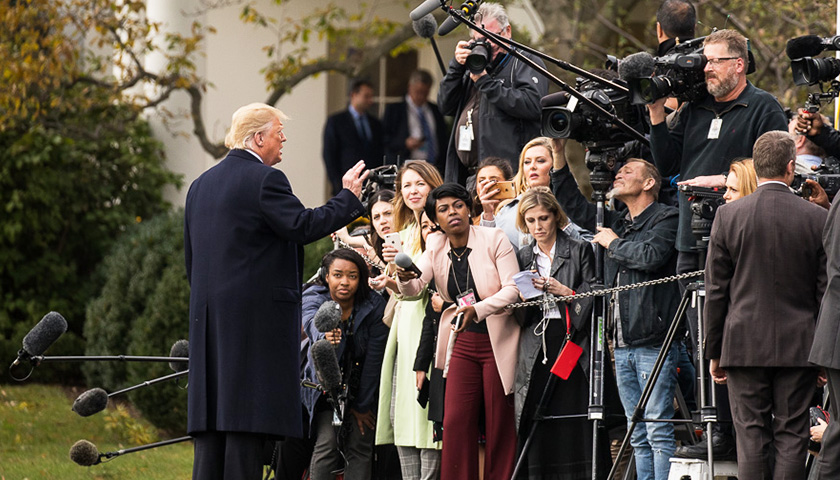by Carson Holloway
As readers of this space know, former President Donald J. Trump is suing CNN for defamation. Trump claims in his suit that CNN defamed him by repeatedly likening him to Hitler and, in particular, by claiming that his complaints about the integrity of the 2020 election are nothing but a “Big Lie,” such as was used by Hitler to win and maintain power. For its part, CNN claimed in a motion for dismissal filed over the holidays that, even if it said everything Trump alleges, he still has no case. According to CNN, its comparisons of Trump to Hitler were mere “opinion” and “rhetorical hyperbole,” not the kind of factually false derogatory claims for which one can sue for defamation.
Now Trump’s lawyers have filed their response to CNN’s motion to dismiss. Their argument is noteworthy not only for the way in which they try to keep CNN on the hook by appealing to the prevailing legal standards of defamation, but also for the way in which they seek to challenge those standards themselves as being too favorable to media organizations that promote inflammatory coverage of public figures. It seems, in other words, that the Trump legal team wants the federal courts — and ultimately the Supreme Court — to revisit New York Times v. Sullivan (1964), the fountainhead of modern American libel law and the source of the legal standards that make it so hard for public figures to sue successfully for defamation.
Again, CNN claims that its numerous Trump–Hitler comparisons are all just “opinion” and “hyperbole” and are, therefore, a privileged form of speech for which one cannot be sued for defamation. After all, the law of defamation is intended to protect people (much less public figures) not from negative opinion but from false claims of fact that are damaging to one’s reputation. Arguing within this existing legal framework, Trump’s lawyers respond that it is strange, and indeed unpersuasive, for CNN to claim that these remarks are mere opinion. After all, CNN bills itself as a source of “news” — as is stated in its name, Cable News Network. Moreover, CNN markets itself as “the most trusted name in news.” Viewed in this context, perhaps it would be reasonable for the court to treat CNN’s assertions that Trump is the same as Hitler as defamatory factual claims. Along the way, Trump’s lawyers observe that, for decades after World War II, American courts held that it was per se defamation to call somebody Hitler.
More fundamentally, and more daringly, Trump’s lawyers also invite the courts to revisit New York Times v. Sullivan and thus to reconsider the legal standards imposed by that ruling. In truth, Trump would have a very hard time prevailing in his suit even if he could convince the court to treat CNN’s comparisons of him to Hitler as fact and not just opinion. The reason for this difficulty arises from New York Times and subsequent cases, in which the Supreme Court held that public figures (like Trump) who claim to have been defamed must show not only that they were the victims of false and damaging statements but also that the statements were made with “actual malice” — that is, that those who made the statements knew they were false or were recklessly indifferent as to their truth or falsity. In practice, it has proven all but impossible to meet such a standard, and successful suits brought by public figures are very rare.
As a candidate and as president, Trump complained about the New York Times standard in his rough and ready way. He said that we need to “open up” our libel laws so as to make it easier to sue the purveyors of false and defamatory material. Now his lawyers are following that call up with their submission to the court.
According to Trump’s legal team, New York Times v. Sullivan should be reconsidered because the doctrine of the case is not accomplishing what it had intended. In 1964, the Supreme Court wanted to make it hard for public figures to sue for libel because they thought the high bar for such suits was needed to protect the First Amendment and the vigorous public debate necessary for self-government. They feared that if it were too easy to sue for libel, public figures might use sympathetic state courts to bring abusive libel suits intended to stifle public discussion of important issues.
According to Trump’s filing, however, whatever the court intended in 1964, decades of experience now show that the “actual malice” standard actually undermines the First Amendment and democratic self-government. By giving big “news” organizations near impunity to defame public figures, that standard permits an often-partisan media to pollute the public discourse with lies — a situation that is hardly conducive to responsible and rational self-government on the part of voters.
This argument deserves serious consideration. (Indeed, I have made a version of it myself and have further contended that New York Times v. Sullivan deserves to be reversed because it is not really based on the original understanding of the First Amendment.) Getting the Supreme Court to reverse any long-standing precedent is, admittedly, a long shot. Nevertheless, it is no longer possible to pretend that Trump’s complaints about the “actual malice” standard are a fringe opinion. As his lawyers observe, numerous respected American jurists have expressed skepticism about what the court did in New York Times: Justice Clarence Thomas, Justice Byron White, Justice Potter Stewart, Justice Neil Gorsuch, and Judge Laurence Silberman.
Will the courts heed Trump’s invitation to reconsider New York Times v. Sullivan? Stay tuned! If they do, it will mark a first step toward restoring the kind of spirited — but also rational and decent — public discourse necessary for a well-functioning democracy.
– – –
Carson Holloway is Washington Fellow in the Claremont Institute’s Center for the American Way of Life.
Photo “Donald Trump Stops to Talk to the Media” by Trump White House Archived.








